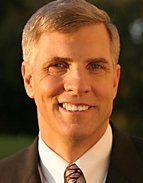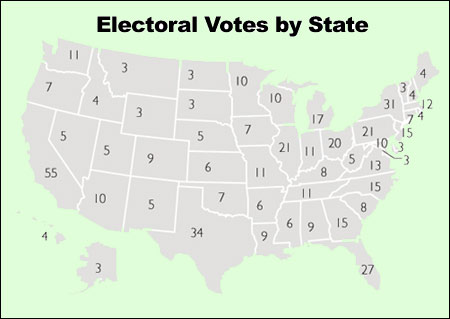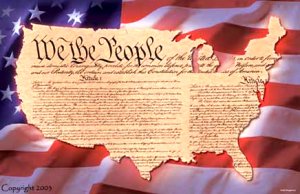 Liberal Democrat Tom Umberg (pictured to the right) is soon to be a retired member of the State Assembly, as his bid to move up to the State Senate was dealt a fatal blow when he did not capture his own Party’s nomination. That said, Tom Umberg is hoping that his legacy as a legislator will be defined by a piece of legislation that he has passed onto the Governor’s desk (with only one GOP vote) that would, if signed, cause California to participate in a scheme to end-run the United States Constitution, and the electoral college that is used to elect the President and Vice President of the United States. Right now, on a state by state basis, depending on who wins a state, each state (by and large in proportion to their population) sends Presidential electors to Washington, D.C. to cast votes on behalf of that state in the Electoral College. We see the physical manifestation of this when we are glued to the television or our computers where we see not only which states go red or blue, but also the number of votes in the Electoral College a candidates has received by clinching that state. Once someone gets a majority of the votes in the Electoral College, they are pretty much the winners of the election.
Liberal Democrat Tom Umberg (pictured to the right) is soon to be a retired member of the State Assembly, as his bid to move up to the State Senate was dealt a fatal blow when he did not capture his own Party’s nomination. That said, Tom Umberg is hoping that his legacy as a legislator will be defined by a piece of legislation that he has passed onto the Governor’s desk (with only one GOP vote) that would, if signed, cause California to participate in a scheme to end-run the United States Constitution, and the electoral college that is used to elect the President and Vice President of the United States. Right now, on a state by state basis, depending on who wins a state, each state (by and large in proportion to their population) sends Presidential electors to Washington, D.C. to cast votes on behalf of that state in the Electoral College. We see the physical manifestation of this when we are glued to the television or our computers where we see not only which states go red or blue, but also the number of votes in the Electoral College a candidates has received by clinching that state. Once someone gets a majority of the votes in the Electoral College, they are pretty much the winners of the election.
Umberg’s bill would have California participate in an opt-in multi-state compact (of which we would  be the first) to pledge to cast all of California’s votes in the Electoral College not for the candidate who wins here in the Golden State, but rather for the candidate that wins the most votes nationwide. The Electoral College was devised by the founders of our nation as a system to empower the individual states over the federal government. But over time, it has become clear that it is also a critical element to maintaining a two-party system in America. If you look back to the 1992 election, Ross Perot claimed 19% of the popular vote for President, but received zero votes in the Electoral College because he failed to win a plurality of the vote in any one state. You can probably predict that the end of an Electoral College system would usher in an age of a multiparty system such as they have in many European nations, where the leader of the country would have to form coalition governments in order to get the votes to win. Without that system, you might find candidates being elected to the White House with a relatively small portion of the popular vote (if you have six or seven candidates splitting up the vote, someone might win with a mere 25-30% of the vote).
be the first) to pledge to cast all of California’s votes in the Electoral College not for the candidate who wins here in the Golden State, but rather for the candidate that wins the most votes nationwide. The Electoral College was devised by the founders of our nation as a system to empower the individual states over the federal government. But over time, it has become clear that it is also a critical element to maintaining a two-party system in America. If you look back to the 1992 election, Ross Perot claimed 19% of the popular vote for President, but received zero votes in the Electoral College because he failed to win a plurality of the vote in any one state. You can probably predict that the end of an Electoral College system would usher in an age of a multiparty system such as they have in many European nations, where the leader of the country would have to form coalition governments in order to get the votes to win. Without that system, you might find candidates being elected to the White House with a relatively small portion of the popular vote (if you have six or seven candidates splitting up the vote, someone might win with a mere 25-30% of the vote).
 This legislation would have two effects – the first would be to start a process that would ultimately do away with our two-party system of governance. The other, on the short term, would be to heavily advantage liberal candidates for President as urban centers, where most of the population is concentrated, will be easier in a logistical sense for candidates to travel to and campaign, and the rural states would see nary a hide nor hare of the ersatz Presidents.
This legislation would have two effects – the first would be to start a process that would ultimately do away with our two-party system of governance. The other, on the short term, would be to heavily advantage liberal candidates for President as urban centers, where most of the population is concentrated, will be easier in a logistical sense for candidates to travel to and campaign, and the rural states would see nary a hide nor hare of the ersatz Presidents.
If California were going to wade into trying to reform the system, it could apportion its Presidential Electors based on percentage of voters received by Golden State voters. While this would still bring about the multi-party system about which I spoke, albeit on a slower timeline, it would certainly bring more active campaigning to California.
You can read this article written by Tara Ross (here on the FR) or this column from George Will on why we should keep the current system. Lefty LA Times Columnist George Skelton makes his case for signing the bill here.
The reality at the end of the day is this – supporting the Umberg bill is bad for the party system and really bad for news for Republicans nationally. So we shouldn’t sugar coat this bill that currently sits on Arnold Schwarzenegger’s desk. This bill is bad for YOUR party Mr. Governor. By signing it, you imperil the very institution that helped you get elected in 2003, and on which you are relying with your campaign this year. We urge a VETO!


September 22nd, 2006 at 12:00 am
1. The Constitution doesn’t say anything about HOW each state decides to select and direct its electors. So how is the proposal an “end run” around the Constitution? I mean, if you want to stick to the “original intent” of the Framers, then parties shouldn’t play any role in the selection of electors at all.
2. Apportionment of electors is no where close to “by and large in proportion to their population”! CA has about 36,200,000 residents and 55 electoral votes. That’s one elector for every 658,000 residents. WY has about 510,000 residents and 3 electoral votes. That’s one elector for every 170,000 residents. Why should a voter in Wyoming have roughly four times the electoral weight of a voter in California?
September 23rd, 2006 at 12:00 am
Todd,
(1) Article 1 Section 10
“No State shall, without the Consent of Congress, lay any duty of Tonnage, keep Troops, or Ships of War in time of Peace, enter into any Agreement or Compact with another State, or with a foreign Power, or engage in War, unless actually invaded, or in such imminent Danger as will not admit of delay.”
Should other assemblies sign on to this, it would violate the Constitution as the state legislature would be initiating a multi-state compact. By compact, I mean, a binding agreement to choose electors that represent the outcome of the national vote; a procedure to tie in other states with a process. I don’t think Congress would even give consent to such an idea, and for the purposes of protecting the Constitution, California should not act on this until there is preceding consent.
This is an end-run around the Constitution because it alters the association of states in the production of elector certificates. Moreover, it is not using the amendment process (which could be launched by coalition-gathering state conventions) because these legislators know darn well that smaller states would never give away their important election status and crack 39 states’ approval.
(2) These are the conditions that the Constitution says the electors can be picked:
“Each State shall appoint, in such Manner as the Legislature thereof may direct, a Number of Electors, equal to the whole Number of Senators and Representatives to which the State may be entitled in the Congress: but no Senator or Representative, or Person holding an Office of Trust or Profit under the United States, shall be appointed an Elector.”
You’re correct that there are not too many regulations on who is picked (12th Amendment), but this flies in the face of the federalist system intended by the Founders, and is a perilous move towards direct democracy.
This plan would submit the 55 electors to the outcome of a national race and would take them outside the will of Californians, removing them from the interests of their state and substituting a national interest. This smacks of the final blow to our Founders’ designs on state-federal federalist balance and would be a further step towards the United State of America, instead of the United States of America.
As a Californian, I would not appreciate my vote being taken away and given to the collective residents of other states. California’s the land of pioneers, not bandwagon followers.
The Benoit bill mentioned by Barry in his last post is more legit, taking our unique system of federalism and applying it politically to make candidates compete district-by-district rather than at-large, or worse, nationally (as is the case with Umberg’s bill). The idea failed on an initiative in Colorado but works in Maine and Nebraska; nevertheless, it is still tinkering with an institution that has worked for over 200 years.
The Electoral College has done wonders to our Republic– it’s original design was firstly a compromise that helped patch up the problems of direct democracy in who chooses the President, the balance of big versus small states (today’s urban versus rural campaigning environments), and the separation of powers– as some advocated having Congress select the executive like the British system.
The Founders knew best, and we’d be wise to preserve the last remaining designs to keep this Republic functioning. We should never let extreme anomalies and political opportunity whither this institution.
September 25th, 2006 at 12:00 am
Since the “end run” comment was proximate to mention of the electoral college, I assumed that was the issue of contention.
Yes, you are right about interstate compacts. I assume the legislation directs the state legislature to seek congressinal permission for the compact, because obviously states can’t enter into a compact without it.
I am not sold on the “The Founders knew best” argument, however. As I noted in my original post, the Founders didn’t even envision the rise of political parties. They assumed the voters of each state would select electors on their own merits. The electors would then use their best judgement to decide for whom to vote. And more often then not, the electoral college would fail to give anyone a majority. Congress would then fulfill the role of picking our President and Vice President.
The current system bears little resembalance to what the Founders envisoned.
Also, under the current system, Californians have already had their vote taken away. We have little influence in either the selection OF party nominees or the selection FROM the party nominees. The former is dominated by places like Iowa and New Hampshire, and the latter is up to places like Florida, Ohio, and even Nevada. I blame Florida for that mess that is Medicare Part D.